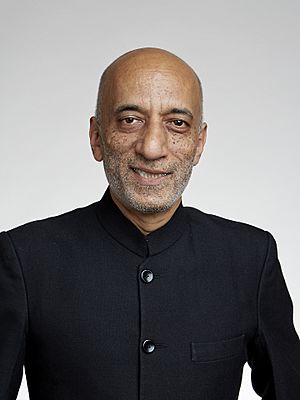Sriram Ramaswamy facts for kids
Quick facts for kids
Sriram Ramaswamy
|
|
|---|---|

Ramaswamy in 2016
|
|
| Born | 10 November 1957 |
| Alma mater | |
| Awards |
|
| Scientific career | |
| Fields | Theoretical physics |
| Institutions | |
| Thesis | Solid like behaviour in liquid layers: a theory of the yield stress in smectics (1983) |
| Doctoral students | Moumita Das |
Sriram Rajagopal Ramaswamy, born on November 10, 1957, is a brilliant physicist from India. He teaches at the Indian Institute of Science in Bangalore. Before that, he was the director of a special science center in Hyderabad, called the Tata Institute of Fundamental Research (TIFR) Centre for Interdisciplinary Sciences.
Contents
Becoming a Scientist
Sriram Ramaswamy went to high school at the Modern School in New Delhi. After that, he moved to the University of Maryland in the United States. There, he earned his Bachelor of Science degree in Physics in 1977. He did very well in his studies.
Advanced Studies
He continued his education at the University of Chicago, where he earned his PhD in theoretical physics in 1983. Theoretical physics is a branch of physics that uses math to explain how the universe works. After his PhD, he did more research at the University of Pennsylvania. This extra research is called postdoctoral research.
Amazing Discoveries in Physics
Professor Ramaswamy is a scientist who focuses on theory. This means he uses math and ideas to understand how things work, rather than doing experiments in a lab. His research explores many exciting areas of physics.
Understanding Active Matter
One of his most important contributions is helping to create the field of active matter. Imagine things that can move on their own, like tiny bacteria or even a flock of birds. Active matter studies how these things move and behave together. It looks at how they turn energy into motion.
How Things Move Together
Professor Ramaswamy is famous for figuring out the rules for how groups of self-moving things behave. This includes everything from tiny cells to large groups of creatures in the ocean. He studied how they align, flow, and interact.
- He predicted that large, perfectly aligned groups of swimming bacteria are not possible.
- He also predicted that adding these tiny swimmers to a liquid could make the liquid less thick, or have very low viscosity.
Scientists have since done experiments that proved his predictions were correct!
Copying Nature's Movement
His ideas have also helped scientists create non-living things that can move on their own. For example, his work led to ways to design tiny particles called colloids that can move towards chemicals, much like living cells do. He also showed how a small number of moving parts can make a whole group move together.
Awards and Special Recognition
Professor Ramaswamy has received many important awards for his amazing work in science.
- In 2000, he was given the Shanti Swarup Bhatnagar Prize for Science and Technology. This is one of the highest science awards in India.
- He also won the Infosys Prize for Physical Sciences in 2011.
- He was even part of the jury for the Infosys Prize in 2014, helping to choose other great scientists.
- In 2016, he was elected a Fellow of the Royal Society (FRS). This is a very high honor for scientists in the United Kingdom.
- He received one of the H K Firodia awards in 2016.
- In 2025, he was elected an International Member of the US National Academy of Sciences.

